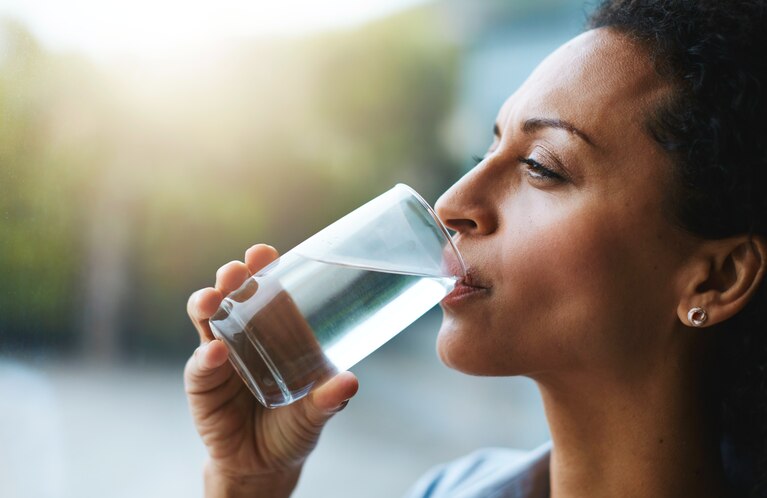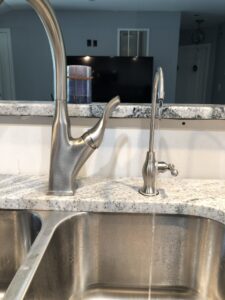Everyone boasts that drinking water is important for your health, and our company’s mission is centered on providing safe drinking water from the tap for all families.
Why, however, is drinking water so important for our general health? If you’ve ever wondered why you should focus more on water throughout the day, this guide will breakdown the key points for you!

Water makes up the majority of your body weight, and is involved in many important functions in the body. Most of your water comes from beverages, but food also contributes a small amount to your water intake. These are just some of the functions water helps your body complete:
Now that you know how water functions in the body and why it is critical to body health, how do you know how much water to drink? Unfortunately, once your body is thirsty, your body is already experiencing a level of dehydration. In order to offset this, you should be drinking purified water continually throughout your day.
“According to the National Academies of Sciences, Engineering, and Medicine, general water intake (from all beverages and foods) that meet most people’s needs are:
About 15.5 cups of water (125 ounces) each day for men
About 11.5 cups (91 ounces) daily for women
People get about 20% of their daily water intake from food. The rest is dependent on drinking water and water-based beverages. So, ideally, men would consume about 100 ounces (3.0 liters) of water from beverages, and women, about 73 ounces (2.12 liters) from beverages.”
When exercising or living in a hotter region, you must increase your daily water intake to avoid dehydration and stay on top of your health. How do you evaluate your hydration levels?
Ideally, your urine should be pale or without color — the darker the urine, the more dehyrdated your body is
Have a refillable water bottle with you where-ever you go; this will encourage you to drink when you’re thirsty and you’ll never be without water
Based on your weight, make note of how much water you need to intake each day, and try to keep track so you know if you are consistently under and need to change your habits
There are smart water bottles available for purchase that help track your water intake and urge you to drink more water by connecting to an app on your phone; these come at many different price points so you can find the right match for your goals
If you normally have a soda for lunch or a beer with dinner, swap those out for a glass of water instead
Even if you don’t use a smart water bottle, you can set alarms on your phone to remind you to drink water – whether it’s every 15 minutes, half hour, or hour, a gentle nudge could be what you need
There are plenty of water flavor packets out there you can purchase to mix up your water taste, or flavor your water pitchers with fruits
Three meals a day meals three cups, or more, of water each day without having to think about it; additionally, water can help stave off hunger, reducing your food intake and assisting with weight loss
Before you begin your morning cup of coffee, drink a cup of water — this will help you feel more refreshed and hydrated as you start the day before you begin your caffeine intake
If you sit at a desk and keep busy during the day, remember to sip! Even sipping every few minutes can add up to a substantial amount of water toward your daily goal
Make sure your bottle or desk glass is always full — when you run out, immediately get more, so you can stay on top of your habits and don’t accidently go hours without a refill
Water is important to nearly every part of your body — not only will hitting your daily recommended intake help you maintain your current state of being, it may even improve your overall health.
Whatever your body or wellness goals are, adding water is an easy perk that has drastic improvements! Get safe drinking water today with a water treatment system from your local professional water company, so you can have constant access to fresh, clean water.


Etching is the erosion of the surface of glassware, resulting in tiny pits or “scratches” on the glass. Sometimes you might notice some effervescent coloring on your glasses in the early stages, or a milky color that will not dissolve off and looks like it has been lightly sandblasted. All types of glassware are susceptible to etching, from dollar store purchases to high-end wine glasses.
Etching results from too much detergent in soft water, items that are pre-rinsed multiple times, or washing dishes in water that is too hot. Etching occurs more often when your water has been mechanically softened by a water softener, but etching cases are evident in all dishwashers, regardless of hard water or soft water.
The etching damages on glassware cannot be fixed, but it can be stopped once you notice it. Here are our top tips to help improve the state of your glassware:
Etching can be a challenging problem, and unfortunately, it is hard to correct once you notice the damage has already been done. It will take experimentation with detergents, water levels, and more to help correct the problem.
To test if your glassware is experiencing etching, or if you are just dealing with a coat of mineral and soap build-up, try the following simple test:
Put some lemon juice on a small area of the affected glassware, and allow it to soak for 5-10 minutes, then wash it off and allow the glass to dry. If the spot you put the lemon juice on is much cleaner than the rest of the glass, then you are not dealing with etching but simple build-up. However, if the spot you put the lemon on looks unchanged then it is most likely etched and you will have to start correcting the issue to protect your kitchen glassware.
We hope this helped! As always, contact National Water Service for more information on your water needs.
National Water Service has been providing residential & small commercial water treatment, plumbing & well pump services for over 45 years. We specialize in water treatment, filtration & purification solutions as well as general plumbing to ensure clean, safe water for our customers in Maryland, DC & Northern Virginia.
Mon - Thurs
7:00am - 5:00pm
Friday
7:00am - 4:00pm
Sat - Sun
Emergency Service Available
National Water Servicing Corporation — 2025 All Right Reserved ™